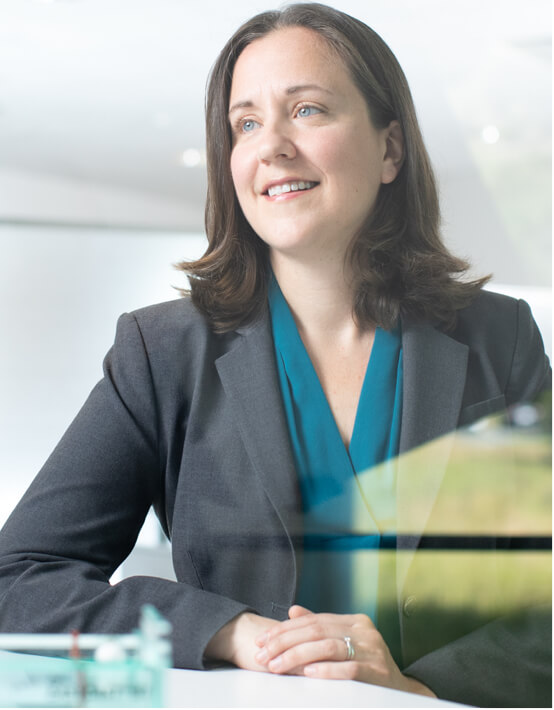by Buck Institute
April 4, 2023 . BLOG
Scientist Spotlight:
Tara Tracy, PhD
Turning obstacles into opportunities
 Tell Buck assistant professor Tara Tracy, PhD, that she can’t do something and it will only make her work harder to prove you wrong. This quality has served her well in her choices for her career path, in her research pursuits and in spearheading an initiative to support women in science.
Tell Buck assistant professor Tara Tracy, PhD, that she can’t do something and it will only make her work harder to prove you wrong. This quality has served her well in her choices for her career path, in her research pursuits and in spearheading an initiative to support women in science.
A pivotal moment that pointed her toward a science career was ironically not a success but a missed opportunity. She still vividly remembers from her freshman year of high school a competitive internship at Rockefeller University, a welcome respite from her underfunded and overcrowded New York City public school. She did not get the internship.
“I felt like it was the golden ticket to go where they have the best science in the world,” she says. “I will always remember that feeling of missing out.” The sting of that rejection served as an early source of motivation. “If something bad happens, or somebody tells me I can’t do something, it just makes me want to work harder,” she says. “That is how I have acted throughout my career.”
Despite not having many science resources in her high school, Tracy was always drawn to the field of biology, specifically how the brain works. After graduating with a Neuroscience and Behavior major from Wesleyan University, she earned her PhD at UC Berkeley. There she studied a wide range of topics in neuroscience, focusing on how synapses develop at the molecular level.
She decided to do something really different from her basic research in neurobiology for her postdoctoral training. She focused on human neurological diseases during a fellowship at the Gladstone Institute of Neurological Disease and UC San Francisco, studying Alzheimer’s disease. “What is funny is that at that time, it felt like a hurdle to cross to change like that,” she says. “But I did it anyway and it turned out OK.”
Tracy’s success at a less traditional career pathway spurred her yet again to pursue a different direction for a faculty position, to focus on aging at the Buck, joining in 2018.
“Alzheimer’s research runs in parallel with aging research,” she says. “There is obviously overlap between them, but only recently has there been more integration of the fields.” Researchers, such as Tracy and others at the Buck, help to bridge the disciplines. “It has been really cool to be a part of integrating these fields,” she says.
Tracy carries the same resolve in her career decisions to her research projects. “If somebody tells me a project won’t work, often I will do it anyway,” she says. “I love the challenge. I get so driven by that way of thinking.”
The risks appear to have paid off. She currently combines her foundation in both basic and translational neuroscience to explore what happens in neurological disease processes, especially Alzheimer’s disease, aiming to repair the damage and restore memory. For her work, Tracy won one of the two 2022 McKnight Brain Research Foundation Innovator Awards in Cognitive Aging and Memory Loss.
Although Tracy has enjoyed many accomplishments in her career, she is deeply disturbed by differences in how women are treated in science compared with men. “Some of the things said and done to women both in the lab and in broader scientific communities are inappropriate,” she says. “Throughout my career and as I went higher up the ladder I’ve noticed this, and some things have happened to me that were upsetting, that I thought were crossing a line.”
The kinds of things women are dealing with, she says, range from getting talked over at a meeting or being singled out to do non-promotable tasks, to being questioned about her potential for success because she has, or wants to have, children.
“If I didn’t have the attitude of ‘I am going to prove everyone wrong,’ I think I would have dropped out,” she says. Instead, she turned her frustration into a passion. She recently set up an initiative at the Buck to support trainees: Buck Women in Science, or “BWISE.”
“This program isn’t going to solve the problem of dealing with society and expectations of other people,” she says. “We can’t control what others do or say, but at least we can prepare our trainees by building their leadership skills,” such as negotiation, networking, and tips on how to climb the professional ladder while managing all the other aspects of life.
“Dealing with these barriers that women face only makes me more driven,” she says. “I don’t want these issues to continue happening to the next generation of women scientists.”

SHARE